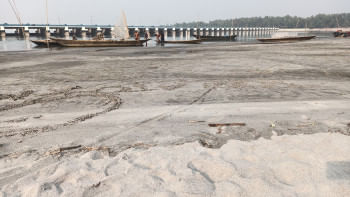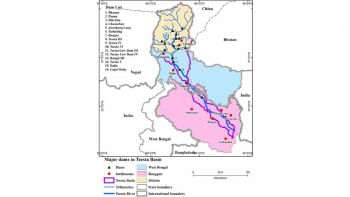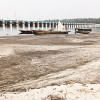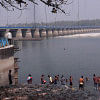How much more must the Teesta bleed?

We are deeply disturbed by news reports that West Bengal is planning to dig two more canals under the Teesta Barrage Project to divert water for agricultural purposes in Jalpaiguri and Cooch Behar districts. It has also reportedly decided to set up three hydropower projects in the Darjeeling hills, two of which are likely to reduce the volume of water in the Teesta that is available for irrigation. There is no doubt that this will only aggravate the already precarious condition of Bangladeshi farmers who have been paying a heavy price as a result of failed diplomacy between Bangladesh and India over the Teesta River for more than a decade.
What is most infuriating is that West Bengal made these decisions unilaterally, without so much as informing Dhaka of its intentions. We remember all too well the last-minute refusal of West Bengal Chief Minister Mamata Banerjee to sign a deal in June 2011, which would have allocated 42.5 percent of Teesta's water to India and 37.5 percent to Bangladesh. For over a decade, despite repeated promises that the Teesta issue will be resolved, there has been no progress at all, with Mamata insisting that there is no water to share in the first place. But if that really were the case, why would her government be pursuing these expensive projects to channel water to farmers on their side of the border?
For far too long, the plight of the ordinary people, particularly the farmers of the northern region, have been ignored by policymakers in both countries, who have prioritised their own agendas in bilateral meetings
After keeping almost 20 million people – who depend on the Teesta for their livelihoods – hanging for 12 years, India's unilateral move is a violation of all international norms of transboundary river water management, to say nothing of India's commitment to not construct any major structure for diversion of water for consumptive uses upstream of Gajoldoba barrage, made 13 years ago. Given our past and current relationship with India, which is supposed to be a friendly one, how are we to interpret the recent developments, if not as a breach of trust?
It is also frustrating that the Bangladesh government seems clueless about these developments. Our foreign ministry, apparently, "will try to know the facts from India" before proceeding further. We can't help but wonder what the role of our officials in Kolkata and Delhi are if they must wait for the Indian media reports to make their way to Bangladesh before they even start the process of "verifying" information.
For far too long, the plight of the ordinary people, particularly the farmers of the northern region, have been ignored by policymakers in both countries, who have prioritised their own agendas in bilateral meetings. According to Bangladesh-India Joint Rivers Commission, between 1973 and 1985 when the barrage was yet to be built in West Bengal, the daily average flow of water in the river during the last 10 days of March was 6,710 cusec (cubic feet per second), which is now as low as 1,200-1,500 cusecs during the dry season.
We urgently call upon the Bangladesh government to seriously revisit the Teesta issue. It is precisely because we have allowed the sufferings of our farmers and fishermen to fall through the cracks for so long that we are now being subjected to such unneighbourly treatment. We must demand greater transparency from India. The Indian government, on its end, must explain the secrecy behind such developments and engage with West Bengal to ensure that no projects are undertaken which violate its commitments to Bangladesh.


 For all latest news, follow The Daily Star's Google News channel.
For all latest news, follow The Daily Star's Google News channel. 








Comments